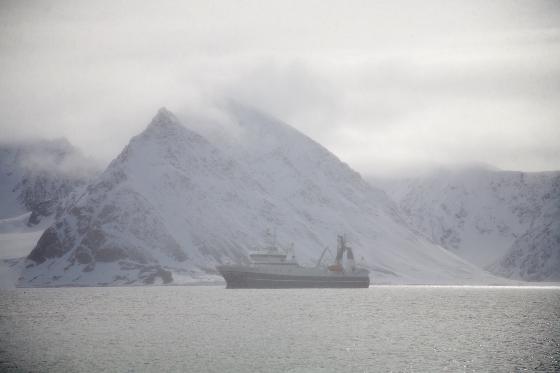SOS from the Arctic!
What if a ship loaded with toxic chemicals founders in the Arctic during the dark months of the polar night? What will become of the crew? And what about the toxic cargo and the fuel that will soon sink through the icy water? How will they affect slumbering ecosystems deep in the winter-dark seas?

Foundering in the Arctic
Imagine that it is November; we are in the dark months and it is bitterly cold in the Arctic. The Oleum, a freighter from Hamburg, is nearing Novaja Zemlya on her way towards the Kara Sea. Her cargo of chemicals is destined for an oil platform in Siberia. In the middle of the bitterly cold polar night, the winds pick up, the waves grow huge and the Oleum rolls and pitches perilously. Suddenly the engine stops. In despair, the captain realises that they are unable to cast anchor because of a thick layer of ice over the anchor winch. The ship drifts helplessly towards land and founders.
Melted Arctic ice means new traffic
This fictitious scenario formed the starting point for the major cross-disciplinary research project called “A-lex”, which addresses the political, legal, environmental, and technological challenges associated with a completely new type of shipping in the Arctic. The background for the project was that over recent years the sea ice in the Arctic has melted so much that the Northeast Passage is open. Nowadays it is possible – for parts of the year – to sail between Asia and Europe via the Arctic.
High risk of loss of human life
One of the researchers’ sobering conclusions is that human lives are likely to be lost if ships founder in the Arctic. Search and rescue services are too far away to be of immediate assistance after accidents. The Arctic is far away from infrastructure; the weather is cold and variable, and conditions are physically demanding for humans. For instance, how would thousands of elderly passengers on a cruise ship cope with this kind of situation?
The project has also uncovered a multitude of legal issues concerning international regulation of shipping, liability and compensation for accidents, and safety for both crews on the ships and search and rescue teams.
Polar night - livelier than it seems
What about the environment? Many of the factors at work in arctic ecosystems in the winter are unknown, as winter research has (understandably) been sparse. It is only in the past 3-4 years that scientists from UiT started going on winter expeditions to the Arctic Ocean.
Until recently, the assumption has been that since sunlight is the basis for all biological production on land and in the sea, and since the sun does not shine in the Arctic during the winter, there is no biological activity in the polar night. And indeed, most seabirds and whales migrate south for the winter – but life doesn’t stop.“This ‘established assumption’ has now been challenged and in many ways repudiated”, says Lars-Henrik Larsen from Akvaplan-niva.
“Fish eat and reproduce in the dark; there is an abundance of zooplankton and they thrive in moonlight and the northern lights”, the scientist asserts.

Chemicals in the cod spawning grounds
So what about the chemicals that disappeared into the dark depths of the sea when the fictitious ship Oleum foundered? The spillage will probably seriously affect the ecosystem. The place where the imaginary Oleum sank is in fact the spawning ground for arctic cod. The fish are not present when the ship’s toxic cargo sinks, but swim in to spawn a couple months later. We know little about how diesel and chemicals might affect the success of the arctic cod’s spawning.
“We see that even though the resources (the fish) in the sea are not present when an accident occurs, a spillage of chemicals or petroleum may harm them at a later time. The resources in the sea are not isolated in time and space, and one must look at both shortterm and long-term consequences of an accident”, says Lars-Henrik Larsen.
Hope for more research
Tore Henriksen, leader of the K. G. Jebsen Centre for Law of the Sea at the Faculty of Law, UiT, hopes that it will be possible to continue research in this area.
“Cross-disciplinary research collaboration is both challenging and at the same time very useful. One has to communicate so that people outside one’s own field understand. But now that we have acquired so much knowledge in the different fields, we would like to continue and we will work to achieve that”, Henriksen concludes.
Photographs: Karine Nigar Aarskog, UiT.Further reading: https://en.uit.no/prosjekter/prosjekt?p_document_ id=363938
A-lex is a collaboration project between the FRAM Centre, the Faculties of Law and of Humanities, Social Sciences and Education at UiT The Arctic University of Norway, Marintek and Akvaplan-niva. Its full name is A-lex: Regulating arctic shipping: Political, legal, technological and environmental challenges.
The four-year project has been funded by the Norwegian Ministry of Foreign Affairs, the Research Council of Norway, the FRAM Centre and UiT.
Last updated: 26.04.2017 15:17